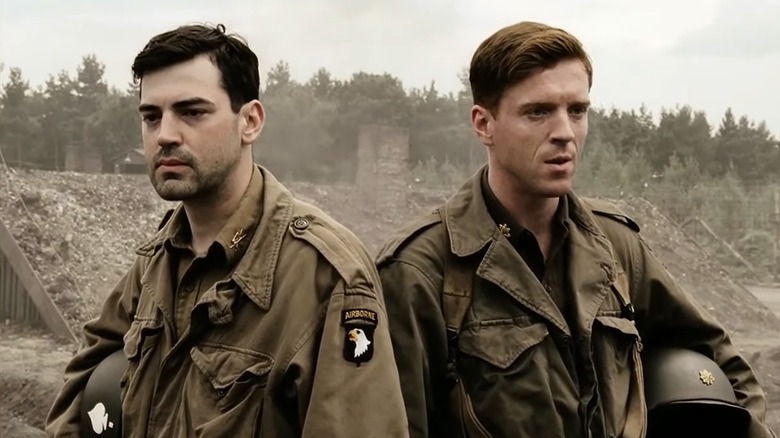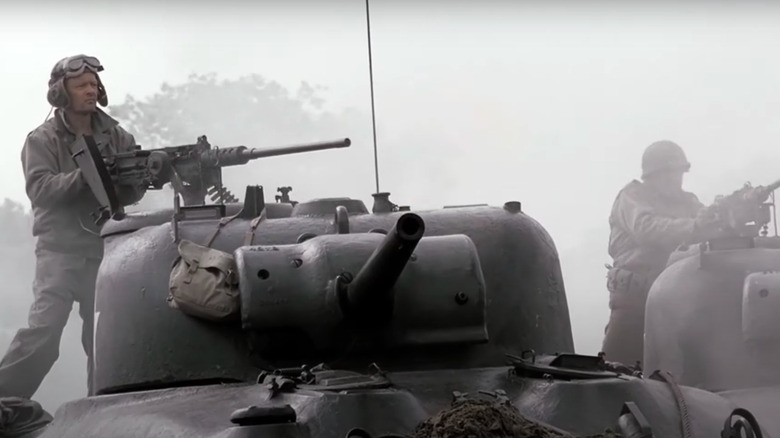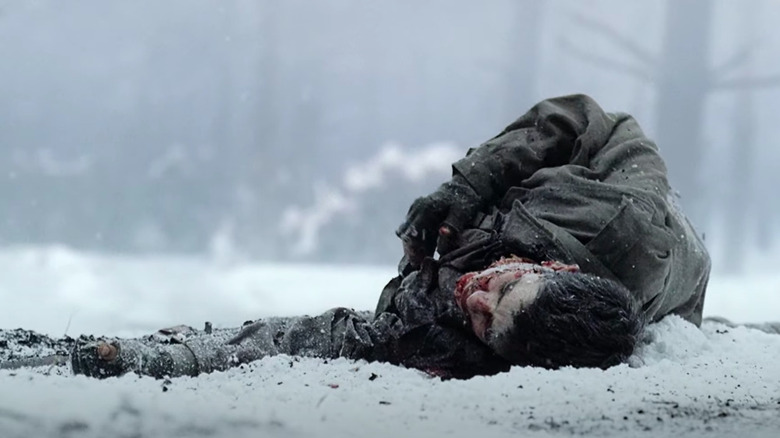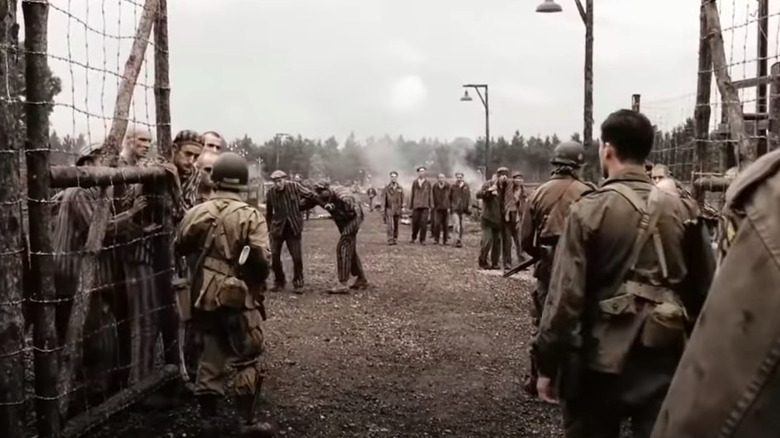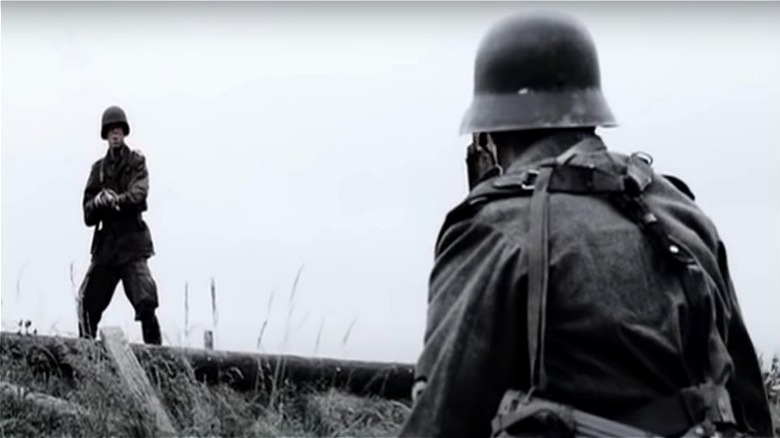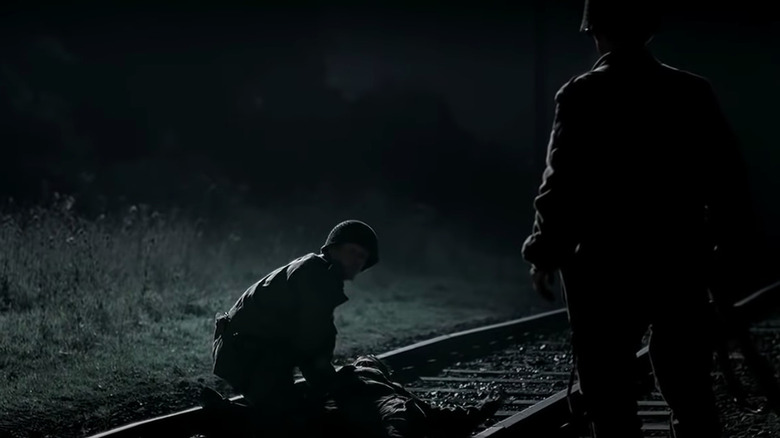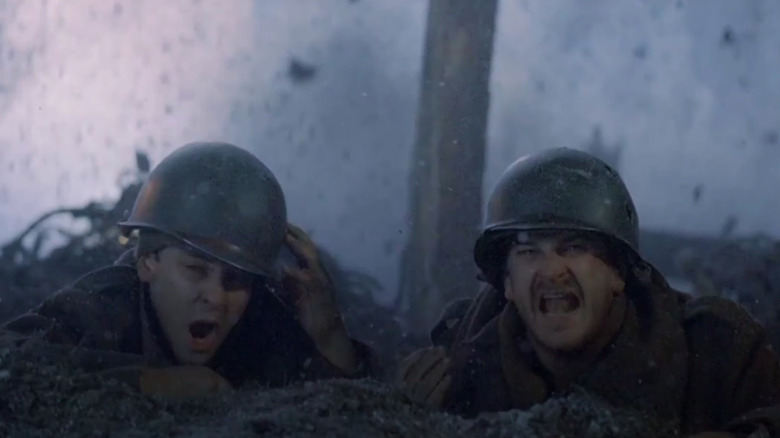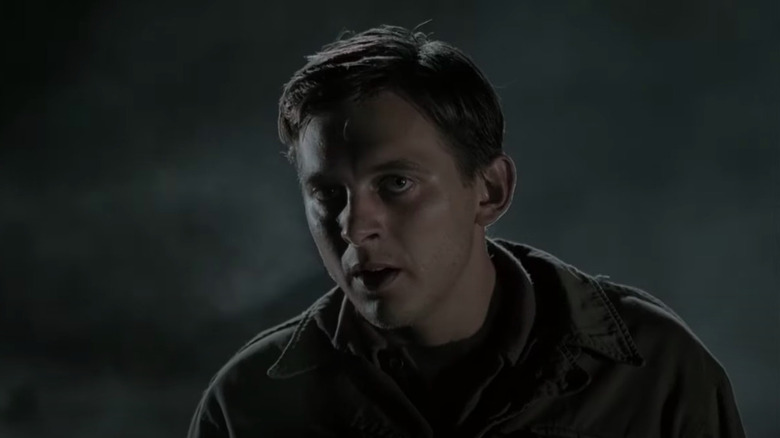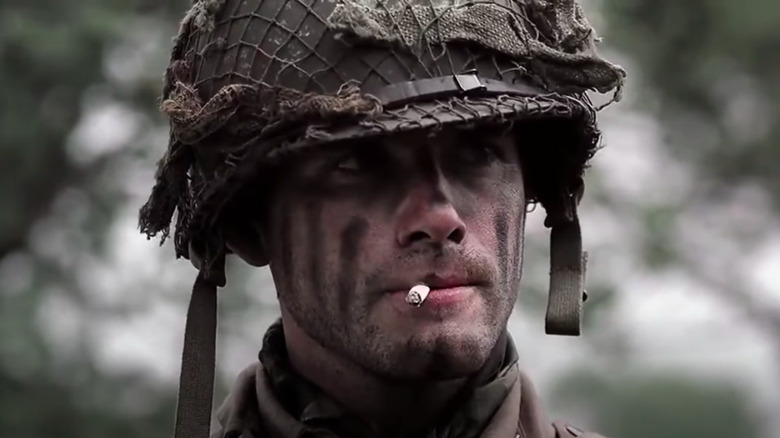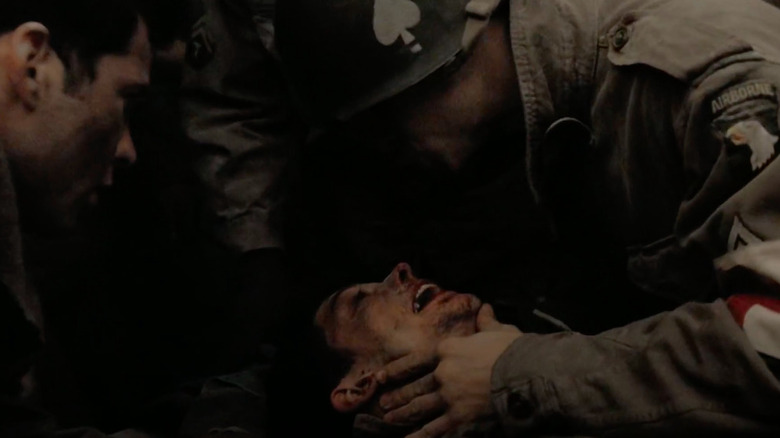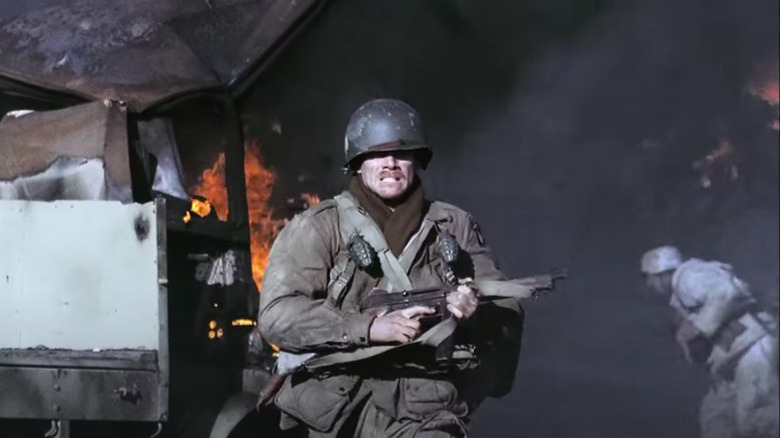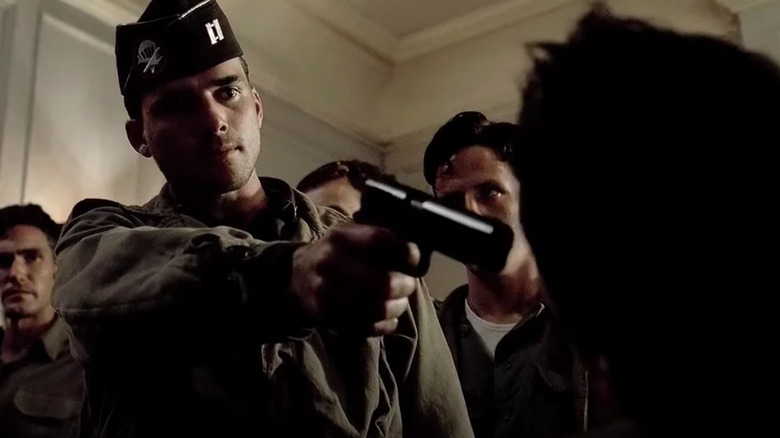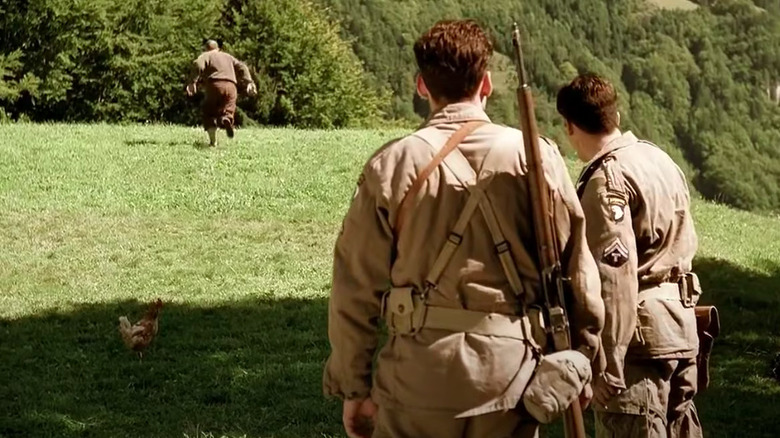The 12 Most Brutal Moments In Band Of Brothers
"Band of Brothers" was one of the first shows to bridge the gap between television and film. It took the baton from Steven Spielberg's "Saving Private Ryan" and improved on it, at least regarding character and story. There is nothing in "Band of Brothers" that is quite so arrestingly savage as Spielberg's genre-changing Omaha Beach sequence. However, HBO's 10-part miniseries is still a thunderous account of World War II, replete with many sad and brutal moments.
Based on Stephen Ambrose's non-fiction book of the same name, "Band of Brothers" follows "Easy" Company of the 101st Airborne Division through Normandy, Belgium, the Netherlands, and the German interior. Human interest is somewhat diluted by the sheer number of characters involved, but there are focalizers in the ranks, namely Maj. Richard Winters (Damian Lewis) and Capt. Lewis Nixon (Ron Livingston). These men and their peers are quickly battle-hardened, facing the enemy in fields, forests, and urban landscapes. "Band of Brothers" depicts these clashes with striking similarities to "Saving Private Ryan," emulating Janusz Kaminski's stark, brilliant camerawork.
So, from the hedgerows of Normandy to the forests of Belgium and the tranquil hills of Bavaria, here are the 12 most brutal moments in "Band of Brothers."
Combat in the hedgerows
In "Carentan," the show's third episode, Easy Company is stationed on the outskirts of the titular town, plotting their advance. Just as they move to seize the initiative, the Americans come under enemy mortar fire, sending them into dugouts and foliage. They retaliate in a desperate scramble, firing their M1 Garand rifles and Browning machine guns. At least one soldier is reduced to a screaming wreck, overwhelmed by the ferocious firefight. The skirmish intensifies when armored units arrive, firing shells and tearing through hedgerows. Men on both sides fall at a terrible pace, struck by lead or shrapnel. One man is even crushed by tank tracks.
The battle continues in the town of Carentan, where Easy Company rushes through streets under heavy fire from MG42s, the fierce machine gun dubbed "Hitler's buzzsaw." Compassion is shown in these desperate moments. T/5 Joseph Liebgott (Ross McCall) pauses to comfort a comrade wounded in an explosion, his face bloodied and his leg virtually destroyed. It's hectic, breathless filmmaking.
Julian is sniped at Bastogne
Julian (Marc Ryan-Jordan), a dear friend of Babe (Robert Laing), is shot in the throat by a sniper's bullet, sending him to the icy forest floor near Bastogne. His suffering is horribly protracted, and Babe, who is mere feet away, can do little about it because of the oppressive enemy machine gun fire.
We catch a glimpse of Julian's throat, which has been brutally torn open and is bleeding profusely. Julian's comrades know that it is likely a mortal injury, but they do not relent in their attempts to save him. They try to inch forward, but the risk is just too great. There is little sense in killing yourself to save a man in this condition. Sadly, by the time the danger is over, so is Julian's life. This was the grueling reality for untold numbers of young men who came of age during World War II.
Concentration camp liberation
As Easy Company heads south, cutting through swathes of German territory, they reach the town of Landsberg in Bavaria. By this point, Major Winters and his men have experienced all manner of death and injury. Yet what they stumble upon in Landsberg is a new and perverse kind of suffering. First, they see the smoke, billowing above the trees into the overcast sky. Then they see high fences and crude earthen structures, from which ghoulish, skeletal figures emerge. These are not prisoners of war. As one inmate explains, they are "doctors, musicians, tailors, clerks, farmers ... Jews, Polish, and Gypsies." They are the victims of Kaufering IV, a subcamp of Dachau, the Nazi state's very first concentration camp.
Easy Company's liberation of Kaufering IV is among the show's most moving scenes. Inmates who don't stare with disturbing vacancy break down in tears, kissing and hugging their liberators. Others collapse, unable to walk. Many are dead, strewn along the grounds. General Taylor declares martial law and orders the locals, who claim ignorance of the camp, to dig trenches and bury the dead.
Major Winters shoots an unarmed youth
Maj. Richard Winters is a model leader. Firm but fair, authoritative but never authoritarian, he inspires his men and runs toward danger with grit and resolve. Yet, even Winters loses his head in the fog of war. It occurs during the most gallant of moments as Winters charges toward a whole company of German troops. However, the first combatant he engages is barely a combatant at all. Youthful and unarmed, the soldier raises his arms only for Winters to shoot him in haste. Winters then points his gun at the company, firing at will as his men back him up.
It's another big, impressive battle scene. So big that we forget about the young kid — the battle's first blood. Winters hasn't forgotten, though. During R & R in Paris, he can think of little else, especially when he sees a young man on the metro who triggers memories of that fatal decision.
Frederick Heyliger friendly fire
In "Crossroads," the show's fifth episode, 1st Lt. Frederick "Moose" Heyliger (Stephen McCole) strolls with Major Winters along a railway track, talking about how to manage men. Suddenly, a command is shouted from the darkness, followed by a volley of gunshots that strike Moose several times in the chest. It's a case of friendly fire, and it has left Heyliger in a very bad way. Heyliger's shooting depicts not only how devastating firearms are, but the shredded state of some troops' nerves, too. With fear, inexperience, and an abundance of lethal weaponry, accidents are inevitable.
Barely conscious, Heyliger is driven off in an ambulance to an unknown fate. Like most of the characters in "Band of Brothers," Frederick Heyliger was a real man, and his accidental shooting was a real occurrence. Fortunately, following skin and nerve grafts, Heyliger survived this ordeal and lived a long life, dying at age 85 on November 3, 2001.
Muck and Penkala die in an artillery strike
In "The Breaking Point," Easy Company is mired in the Battle of the Bulge, which is centered around the Belgian village of Foy. Artillery strikes are a constant threat on many battlefields, but in the forests around Foy, the German artillerymen are almost a force of nature. Shells hit the American positions with very little reprieve, churning mud, felling trees, and inflicting death, destruction, and trauma on the men of Easy Company.
All of this hits particularly hard in the dead of night when T/4 George Luz (Rick Gomez) shoots the breeze with Sergeant Muck (Richard Speight) and Penkala (Tim Matthews). Their brief levity is interrupted by yet another artillery strike, dispersing the men in a panicked and somewhat futile dash for cover. Muck and Penkala beckon to Luz, who's crawling along the forest floor, to join them in their dugout. However, as he nears them, a shell strikes Muck and Penkala, causing them to simply disappear.
Pvt. Floyd Craver runs amok
By "Points," the show's 10th and final episode, the war in Europe is over. However, tensions still run high in occupied Germany. A generation of men has been through hell, and some of them, including Pvt. Floyd Craver (Jason Done), have been consumed by it. Armed with a .45, Craver murders several Germans and a British major.
We discover this crime from the perspective of Sergeant Grant (Nolan Hemmings), who nears Craver, questioning him. Craver is behaving in a completely wayward and deranged manner, yet Grant continues to follow him, his pistol holstered. It seems that Grant may be too distracted by seniority to fully grasp how dangerous this private is. Unfortunately, he finds out with a bullet to the head. It's a shocking moment. "Band of Brothers" is full of violence, yet it rarely feels so wantonly criminal as this. Remarkably, the real Sergeant Grant recovered from his injuries, albeit with speech issues and partial paralysis.
Captain Speirs gives German POWs cigarettes and then murders them
The real-life Capt. Ronald Speirs had a reputation for shooting German prisoners of war. He was also said to have shot an American platoon sergeant. The veracity of these claims is unclear, but Speirs had a reputation for brutality. "Band of Brothers" addresses this in "Day of Days," the show's second episode.
In a post-battle lull during the Normandy campaign, Speirs (Matthew Settle) asks half a dozen or so captured Germans if they want cigarettes, which they happily accept. However, these tokens prove to be something of a "final meal." Speirs proceeds to open fire with his Thompson submachine gun, presumably killing the men. I say "presumably" because we don't see the killing. Instead, we see Donald Malarkey's (Scott Grimes) disturbed expression as the shots ring out. The presentation of this scene places us in the rumors, too. We don't know exactly what Speirs did, so when the men of Easy Company speculate later in the episode, we enjoy no dramatic irony.
Eugene Jackson's death
Messy, chaotic, and tragically wasteful, the death of Eugene Jackson (Andrew Lee-Potts) represents the ugly realities of war. During a village raid in Haguenau, France, Jackson throws a grenade through a building window before charging through the front door. Mistiming the explosive, it detonates right in front of him and inflicts nasty injuries to his face and neck. His comrades get him to safety on the other side of the river, dodging a hail of bullets. Yet, there is still little order when they arrive on their turf. Men tend to Jackson, unsure of what to do, while others bay for German blood, rushing at two prisoners of war with fists and firearms. When a medic finally arrives, Jackson appears to choke, dying moments thereafter.
"His family, I'm sure, got a telegram from the war department, saying he died a hero in an important mission that would help win the war," Private Webster (Eion Bailey) narrates, "In fact, Eugene lost his life on a stretcher in a dank basement in Haguenau, crying out in agony while his friends looked on helplessly."
Capture of Foy
There was more to the Battle of Foy than horrendous artillery strikes. The men of Easy Company had to take the village by charging into danger and death. And they did so under the new leadership of Lt. Norman Dike (Peter O'Meara), who was not fit for the task. "You have to keep moving!" cries Major Winters, observing from the sidelines. Even Dike's men bellow in his ear, urging him to move forward and break through the onslaught. Yet, Dike fails to take any initiative, frozen with terror behind a hay bale. It's a rational response, of course. The weight of responsibility must be awful. However, this leadership is not acceptable. Unable to intervene himself, Winters orders Captain Speirs to take lead, which he does with total focus and bravery, running through the battlefield with such audacity that the enemy pauses in astonishment. The brutality of the scenario is not so much in the visual detail but in the maddening terror of ordering young men to charge into certain death.
The battle appears to end with Speirs and his men taking the village and some 100 prisoners, but the bloody sacrifice is not over. As the men sing in celebration, a sniper fires in rapid succession, hitting two men, one in the head. Shifty (Peter Youngblood Hills) takes out the threat with a well-aimed shot of his M1 Garand.
Captain Speirs almost executes Private Craver
The aforementioned Private Craver, who murdered several Germans and a British major as well as seriously wounding Sergeant Grant, looks death in the face upon capture. Easy Company beats the private to a bloody pulp before calling in Captain Speirs, whose callous reputation precedes him. The mood in the room tacitly encourages Speirs to draw his pistol and finish the job.
The officer appears to oblige, whipping Craver with the butt of his .45. "When you talk to an officer you say 'sir'," taunts Speirs, his face blank and icy. He then points the barrel at Craver's head, causing the men to back off in anticipation. However, Speirs' aim begins to waver and, despite no man objecting to what they think the captain is about to do, he relents. It is a disturbing moment because it happens outside the "conventional" violence of combat. This is bloodshed of a personal, deranged kind, consequences of a war that's conditioned a generation to maim and kill.
Liebgott brutalizes a suspected commandant
In another example of loose laws and loose morality, Liebgott raids the home of a suspected concentration camp commandant, and he does so not with the intention of lawful justice, but of blunt summary execution. "What if he's just a soldier?" reasons Private Webster, "What if he's an officer with no ties to the SS?" "What if he's a f***ing Nazi commandant of a f***ing slave camp?" retorts Liebgott, angry and impatient. Webster is war-weary by this point. The conflict is over, and he wants nothing more than to go home. Yet, Liebgott still has fire in him, especially since the discovery at Kaufering IV.'
The inquiry is shambolic from the start. Liebgott bursts into the chalet, which is set in the idyllic Austrian alps, and brandishes his weapon, shouting and swearing at the modest, middle-aged suspect. Webster leaves the property, unwilling to witness more brutality. A shot rings out and, to Webster's surprise, the suspect charges out the door and runs for the hills. Liebgott follows but his pistol jams. His comrade's M1 Garand is just fine, though, and a squeeze of the trigger sends a round into the man's back. Neither we nor the soldiers ever find out if the man is guilty. Some may lament the notion of how victors write history, but "Band of Brothers" does not ignore the transgressions of American troops.
